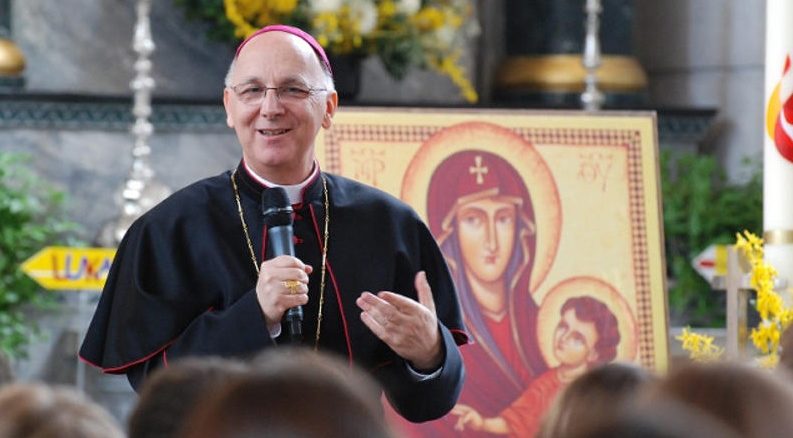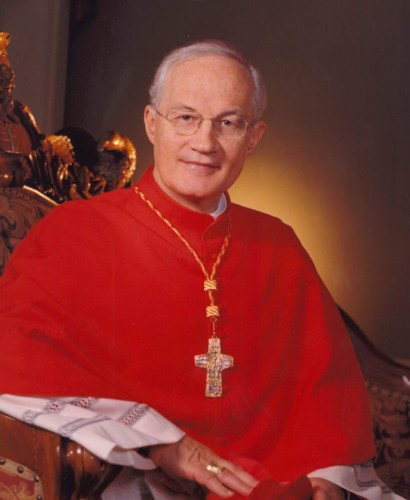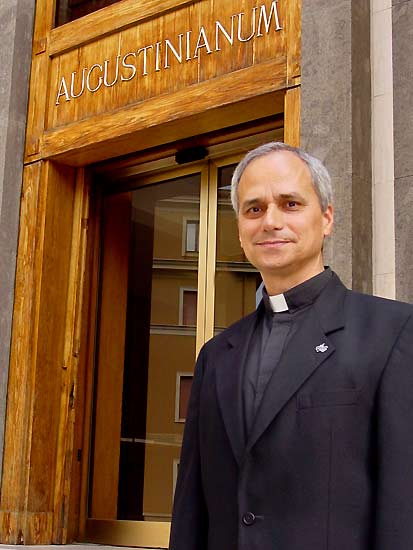Father Werenfried van Straaten in a picture of the aid organization he founded, Church in Need, where a pathetic "purge" of its founder is currently in progress.
Notes by Giuseppe Nardi
The steamroller is once again being driven around in the German Church. That's not new. The stage directions are known, hence who is steering the steamroller and against whom it is directed. And the result is also foreseeable. The victims are currently a cardinal and a long dead man who can no longer defend himself. How convenient.
In a decades proven alliance between left main-stream media, and progressive Church circles are conquering and defending positions of power. Bit by bit, the axis in the Church in Germany has been shifted to the left over the past 60 years. Every successful operation does not mean saturation, but only an intermediate stage to the next operation. What personalities and institutions stand in the way of “another” Church are dismantled. Labels are awarded for this so that the non-church allies always and immediately know who is friend and who is enemy.
The first labels were for the so-called “pre-Conciliarists” including the variants “backward-looking”, “the day before yesterday” and “archconservative”. The latter title became a "long runner". It is suitable to this day. The Mainstream, so far removed from any understanding of the Church, that not the slightest chance exists for more than merely a minimal understanding, means that any Church representative, who isn't stamped with the "seal of approval:" progressive, left, liberal or modern, is considered "arch-conservative." But that is only one of several practiced assasin vocabularies.
As early as the 1960s it became clear that the interplay between inner-Church circles and non-church media results in an efficient alliance that benefits both sides to achieve a shift in power in the Church for one and the enjoyment of Church dismantling for the other.
Many well-known and less well-known Church representatives have since fallen victim to this unholy alliance. When they licked blood in the 1990s and realized that they could even “shoot” bishops, things really got going. Since then, one campaign has followed the next, always with the same pattern, always with a shameful pretext, always with the same hunting party, always with a prominent victim, always with another axis shift to the left. The trophies include prominent names such as Archbishop Haas, Bishop Mixa, Bishop Krenn and, with Archbishop Groer, even a cardinal. One to one was implemented in the Church area, which was also the case in the political area. The most recent example of this alliance is the presidential election campaign in the USA. With the election of Pope Francis, the unholy alliance has moved into the highest position.
According to the Maoist principle, one opponent must be beaten by way of example in order to intimidate a hundred opponents. Every successful persecution in the past decades has meant a growing intimidation of conservative Church circles, even greater reluctance, and even more abstinence from the public. It also meant that the criteria for the selection of future bishops were constantly being scaled back and adjusted. The dominant image was that of docile submission in the hope of appeasing the hounds. Nothing of the sort happened, as was foreseeable, which frightened conservative Church leaders even more and made the superiors, who openly or surreptitiously sympathize with the left, ever bolder.
So bastion after bastion was lost. Anyone who looks at the Church in the German-speaking area today can no longer imagine a situation that still prevailed in the 1950s. Most bishops may be pious men, at least this is what the believing heart hopes, but with only a few exceptions they are characterized by two aspects: They are latently, even if gradually graduated, positioned progressively. And the less progressive they are, the less leadership they show.
In the past 60 years, the Church was dismantled not from below, but from above. It is also not conceivable otherwise in a hierarchically constituted, divine foundation.
Hunt for Cardinal Woelki - the hunters are called Marx and Bätzing
The most recent prey selected by the hunting party is the Archbishop of Cologne, Rainer Maria Cardinal Woelki, and the "Bacon Priest" Werenfried van Straaten. Cardinal Woelki does not necessarily belong to the type of bishop and prince of the Church who should go down in history. His unforgivable flaw is that he is more conservative than the left-wing majority of the German Bishops' Conference. His institutional position as Archbishop of Cologne and Cardinal of the Holy Church makes him a troublemaker among his confreres. And in 2018 he dared to turn to Rome against the impossible majority decision of the Bishops' Conference to admit Protestant spouses to Holy Communion. What under John Paul II and Benedict XVI. in extremis was able to remedy the situation, but since Pope Francis rules Rome, it became an own goal.
The Congregation for the Doctrine of the Faith wanted to take action, but was called back by Francis. Cardinal Woelki had exposed himself without being able to achieve anything. The small minority of bishops he heads because of his rank were counted. The DBK majority found Woelki's heckling against the "Synodal Way", with which the Church in Germany is on its way to schism, is no less disturbing.
The reaction to this is that the majority leaders of the Bishops' Conference are working towards the transfer of the Archdiocese of Cologne, one of the largest, richest and most important in the Church along with those of Milan and Chicago, into other hands. It's all a question of power. So it is not surprising that the most dangerous headwind for Woelki does not come from any media, but from the Church itself. Nor is it surprising that Cardinal Reinhard Marx, as Archbishop of Munich and Freising, the holder of the most important bishop's seat after Cologne, and Bishop Georg Bätzing, the President of the German Bishops' Conference, put themselves in the limelight as Woelki's most vocal critics.
The excuse can always be found. That seems to be the slightest problem in a dishonorable power struggle: whether dodgy behavior by religious women in the diocese of Speyer, or whether dealing with a clerical abuser in Cologne. But anyone who assumes that one or the other case is actually at issue is vastly wrong. It's about a power struggle within the church that is supposed to bring Woelki to his knees, ideally even to steal the Archdiocese of Cologne from him.
The second hunt illustrates this striving for power even more clearly, because the "prey" is long dead. Buckets of dirt are pelted at an outstanding, but long-dead personality. It is a kind of monument fall that has been in vogue on the left not only since the racist machinations of organizations like Black Lives Matter.
The Bacon Priest - a fighter who suffered less and less after 1968
The Dutch Premonstratensian Werenfried van Straaten, canon in the Flemish Abbey of Tongerlo, was one of the real greats of the post-war Church. When Germany was the war on the ground, he did something that probably today by definition would already regarded as shameful and intolerable. He began to help the defeated Germans who had been displaced and made homeless in the millions. This resulted in the Ostpriesthilfe because Father Werenfried initially helped the Catholic priests from the eastern German regions and linguistic islands, who were stranded as displaced persons in the western Allied occupation zones. Over time it became an international aid organization for the persecuted Christians behind the Iron Curtain, and later worldwide. In 1953 he also founded the Bauorden, in which young adults could help with social and non-profit building projects. The first projects were homes for German displaced persons.
Wherever Father Werenfried preached, he filled the churches in the 1950s and 1960s. For an extensive media apostolate he used the most modern means available. Above all, however, he was not a man of low tones. When in the course of the Second Vatican Council the wind shifted in the Church, which also hit him. His adherence to ecclesiastical social and moral doctrine and his understanding of the Church made him as a “conservative” more and more an undesirable person. This development within the Church coincided with the overall development, as the political left seemed to be spurred on by an apparently unstoppable rise in the 1970s. The Bacon Priest was denounced an enemy, as it states in the anticlerical communist East block and the local Catholic underground Church, but it also supported the persecuted Orthodox Church. Communist groups in West Germany controlled by the KGB and MfS from Moscow and East Berlin targeted Father Werenfried.
His main problem, however, was that he was no longer suffered within the Church in the 1980s and was therefore increasingly left out in the rain by his own side. The division of Germany seemed irreversible to many, anti-communism only a nuisance. Eventually Father Werenfried began to be marginalized. In some dioceses he was hardly suffered any more and had to be happy if he got churches to preach there. Through his fiery words to the conscience of the people, with which he also addressed those topics that hardly anyone dared to address in the Church, such as chastity, celibacy, marriage, the right to life of unborn children, he had become an outsider.
He did not let that deter him. He had with the relief organization Church in Need, as the Ost Priesterhilfe was now called, because its area of operations had expanded, created something lasting, something that the Christians persecuted more than ever needed worldwide. When Father Werenfried - a name, a concept - died shortly after his 90th birthday in 2003, he was no longer in the middle of the Church where he had started, but rather on the edge. Not because he had changed, but because the leading Church districts had changed.
He was lucky to have found a capable successor in his niece Antonia Willemsen, who continued his legacy with the help of capable employees. In doing so, they understood this inheritance in full in the sense of the Bacon Priest only as material help for the persecuted Christians in distant countries, but also as spiritual help for the Christians in the western states. The German section in particular developed a number of initiatives for evangelization in the German-speaking area after the turn of the millennium. The relief organization, still disliked by Father Werenfried in some Church circles, was seen by progressive Church representatives as one of the few remaining “conservative” organizations, which is hardly tolerated today.
Since the death of Bacon Priest there is a more or less intense impulse contending for control of ACN in progress. This not only has to do with the ideological opposites described, but also with desires such as power and influence. In order to have their backs, some personalities are pressing to limit themselves to helping persecuted Christians abroad. Also a form of quiet kicking.
The dirt buckets with Church tax money
Yesterday, the supplement Christ & Welt of the left-liberal weekly newspaper Die Zeit published a frontal attack on Father Werenfried. A confidential letter from a now retired auxiliary bishop from 2010 had been leaked to the paper, listing aspects of Rome that could stand in the way of a possible beatification process. It's routine. In the Roman method, there is, the historical figure of advocate diaboli. These references would only be relevant if they were confirmed.
The letter was sent to the Church in Need, the German bishops and the Vatican. It is not difficult to imagine from which side it was leaked to the Hamburg newspaper editors. For this, it is enough to know that Christ & World since 1980 was owned by the German Bishops' Conference, is that as editorially independent special supplement of the weekly newspaper since 2010. The time is displayed. The attack is financed with Church tax money.
On February 10th, Christ & Welt (Die Zeit) published the accusation against Father Werenfried under the title “Good and Evil”. The two authors use that mocking and derogatory tone that is now taken for granted in left-wing circles when reports are made about people who think differently. So it says boldly in the opening credits: "What happens to the Church if it loses an icon?"
The focus is on an alleged "coercion", also known as an alleged "rape attempt", which the then 60-year-old Werenfried is said to have undertaken against a 23-year-old employee. The charges are being flogged 18 years after the death of the Bacon Priest. The alleged victim did not report herself until years after his death.
The accusation of sexual abuse (for once, not homosexual) is currently the most targeted manslaughter instrument against a cleric and the Church as a whole. Indeed, shameful things have been done and neglected by a small clerical minority, think of the McCarrick case, but mostly in a homosexual context. This club can be swung particularly easily against Father Werenfried: he can no longer defend himself.
The extent of the dilemma in which the Catholic world finds itself in our latitudes has become evident in the past few hours. In fact, there is nobody to defend Father Werenfried, while the media in unison drag his memory through the dirt without questioning it. The younger ones don't know him anymore. In addition, the different parts of the Church have drifted apart, an organization like Kirche in Not [Church in Need], which has been branded with the label “conservative”, feels this particularly hard.
The result was shown yesterday. No sooner had Die Zeit started its shameful attack, reminiscent of the conviction in a show trial, than the aid organization Church in Need went on its knees, without a fight and weak in the knees as pudding. Thomas Heine-Geldern, the managing president, hurried to keep the greatest possible distance from Father Werenfried and implicitly hammered hard on the monument of a great man, as if he were eager to support the two Zeit journalists in the fall of the monument. To get praise and recognition? The motto in the aid organization's headquarters in Königstein seems to be: "Save yourself, whoever can!"
Heine-Geldern listed a total of 27 partly redundant points, which are a single pathetic dismantling of the renouned Bacon Priest. A shameful act by someone who basks in the life's work of Father Werenfried, but does not even attempt to defend him. A mere shout from a certain side is enough to capitulate today.
Nothing should be ruled out, but credibility and probability are at stake. It is not enough to jump out of cover after 36 or 48 years, that is, six or 18 years after Werenfried's death, and make the most serious accusations. The executive president of Kirche in Not, Heine-Geldern explains succinctly that the description of the then 23-year-old woman about the alleged coercion, alias rape attempt, is “credible”. That is not enough to take a guilt for granted, but that is exactly what the Heine-Geldern declaration means. In this way every deceased could be destroyed effortlessly. With Friends Like These, who needs enemies?
Whoever got to know Father Werenfried personally, like the author of these lines, knows about his integrity. Of course, even in the 80s it was a pleasant exception in the midst of the Church leaders who lagged behind the zeitgeist. It is therefore not enough for me what allegations are now being brought against him by journalists financed by Church taxes with obviously destructive intent, and it should not be enough for anyone.
What “credible” means is known since the literally unbelievable allegations against Hans Hermann Cardinal Groer. The archbishop of Vienna at the time did not fall because of the hostile, campaign-like attacks by the media and politics, but because of internal Church bills that were paid and because of the cowardice of Church officials, whose duty it would have been to defend the cardinal. Instead, those who wanted to "wash their hands in innocence" as quickly as possible, prevailed. The fact that the accused had to jump over the edge was accepted in a weighing of interests in which it was asked what was “more important”.Some did not want to put themselves in the line of fire of the press and socialists.
A similar calculation seems to have been made in today's leadership of the Church in Need. The "credibility" that Church in Need President Heine-Geldern mentions sounds like a fearful endeavor to get rid of a story that was perceived as unpopular - and that means buckets of filth for the media. The result was available yesterday. Father Werenfried van Straaten, a great figure in the post-war Church era, does not deserve that.
And many do not seem to have earned their offices and posts in Church in Need and the German Bishop Conference.
Image: Church in Need (screenshot)
Trans: Tancred vekron99@hotmail.com
AMDG






